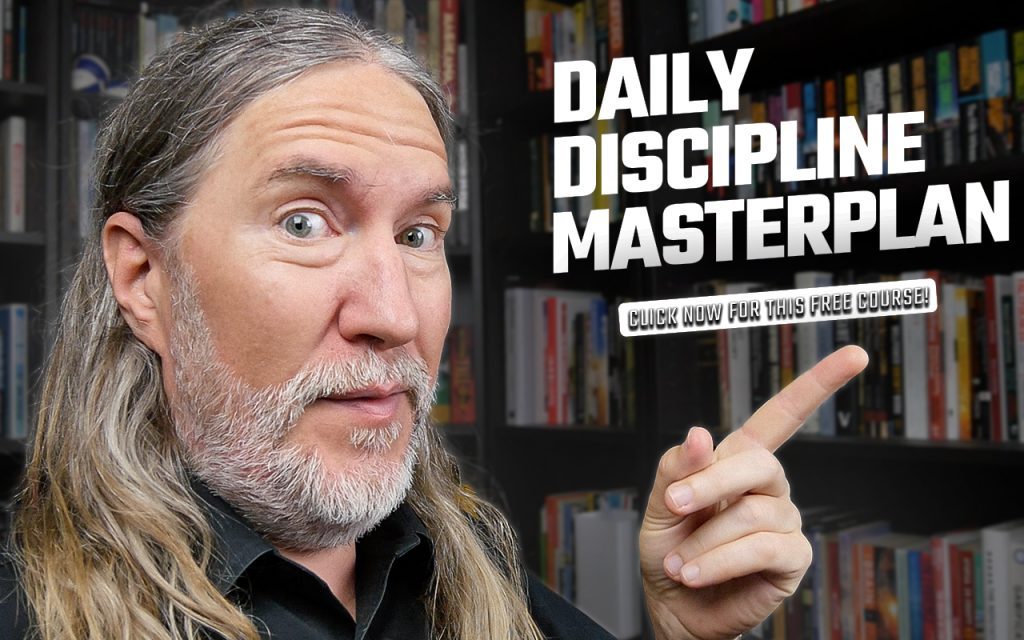I used to mock quotes filled with kind thoughts.
I was a heavy metal kid filled by rage and regrets. And I interpreted philosophy in the darkest ways possible.
Then one day, I heard Wayne Dyer say a few things I’ve never forgotten. (I’ll share some of them with you below.)
Why the heck was such a brutal person like myself suddenly listening to a “self help guru”?
Well, my mind had become such a trash bin that it was hurting me badly.
In fact, my mental content had been threatening to take my life for years.
So I was listening desperately to all kinds of gurus to figure out what they had that I didn’t.
And although dietary changes and focusing on my sleep and fitness helped, those things were just part of the puzzle.
My habitual pattern of defaulting to dark thoughts had to go.
So if you’re ready for a bunch of kind thoughts examples and quotes, including a powerful lesson in how to start thinking them automatically yourself, let’s dive in.
What Are Kind Thoughts?
Asking this question is really important, even if it seems obvious.
In reality, it actually isn’t that obvious.
For example, compassion wasn’t always held with the same esteem it is today. Many philosophers throughout history have thought that compassion and empathy were forms of weakness.
And sometimes, we do have to recognize that there are times when we’re not helping ourselves by pandering. We sometimes need to ask personal development questions that aren’t necessarily easy to process.
This means that critical thinking is sometimes the kindest thing to do, even if it hurts.
That said, I generally think that kind thoughts are an antidote to unkind thoughts. Here’s what I mean.
3 Examples of Kind Thoughts
I took an art course from Riven Phoenix years ago. He said something I’ll never forget.
He said that if you learn to draw, you will never see ugliness again.
I seized upon that idea as I learned to draw the human face and body. And from that moment, whenever I’ve caught myself thinking that someone is ugly, I’ve transformed the thought into something much more positive.
The kind thought that emerges in its place is kind of abstract. It’s a thought based in wonder, rather than criticism. I often think instead how incredibly interesting it is that reality cooks up so much variety. It’s never boring when you pay attention to the details.
So as we go through these examples, I start with this one so you realize that kind thoughts don’t always have to be direct or concrete. They can be conceptual as well.
Many can also become like personal mantras, which is one of my favorite ways to experience kind thoughts. You’ll see what I mean in a moment.
Example One: “We’re All In The Same Boat”
Confucius is one of my favorite philosophers.
There’s a great line in the Analects, which reads:
Under heaven there is none that is not swept along by the same flood.
That’s a fancy way of saying we’re all in the same boat.
I find this such a powerful kind thought while working on personal growth because it instantly reminds you that no one is alone in their pain.
We really are all swept along by the same flood because we’re made of the some material. Read from a Taoist perspective, the flood in the Confucius quote is reality, something we all have to deal with in our own way.
But the idea that any of us are unique is an unkind thought that separates us from others. This thought binds us closer to our shared experiences.
Example Two: “Give All The Love You’ve Got”
Sometimes when I have a quarrel with my wife, it’s easy to retract love.
But I mentally move towards kind thoughts instead – at least as much as possible and as soon as possible.
This kind thought is so key because arguments happen. And by giving all the love you’ve got not matter what’s going on, you can get back to what I call “cruising altitude” very quickly.
That’s a state of flow and receptivity, instead of pushing others away with mental garbage.
Example Three: “Be Kind”
Derren Brown ends one of his books that way.
It’s probably the ultimate kind thought because so often we’re given multiple choices, and kindness doesn’t have to be the one we choose. There’s no law in the universe that drives us toward it, even though it’s the best option most of the time.
For example, I run online businesses and when dealing with email, I am given ample opportunity to return snarky emails with more snark.
But I usually resort to this simple and kind thought. Reminding myself to “be kind” is not turning the other cheek, however.
It’s possible for me to be kind and not be a pushover at the same time. Often I do that by politely thanking the individual for their criticism and then asking them if they think they are being fair to use all caps or complain before they’ve completed one of my courses in full, etc.
It’s kind of like holding up a mirror, and nine times out of ten, the person will respond with the kindness I’ve shown them in return.
7 Ways To Transform Yourself Into An Automatic Thinker Of Kind Thoughts
As we know from studies in implicit memory and procedural memory, most of our thinking happens automatically.
I first started to realize this when listening to Wayne Dyer. He said that we tend to play games of comparison with others and this can lead us to thinking that we’re either better or worse than our fellow human beings.
But like Confucius, Dyer encouraged us to catch ourselves in the habit of thinking such low-quality thoughts and replace them with better ones.
He also helped me deal with scarcity and lack I felt around my position as a professor. In my role, I often felt frustrated and discouraged that my students weren’t following my lectures.
Dyer pointed out that you could never be rich enough to remove poverty around the world. Nor could you ever be poor enough to purge yourself of the problems of living in our current kluge of economic systems.
These kinds of self reflection reveal the poor thinking habits so many of us suffer.
So the question is, once we start realizing we’re suffering from unkind thoughts, how do we make thinking kind thoughts automatic?
Technique One: Make Your Thoughts Visual
Journaling has been shown to to help with depression and promote happiness, especially when you keep a gratitude journal.
But you can also journal to discover how your thought patterns emerge.
Gary Weber gives a great exercise in Happiness Beyond Thought.
As you draw a line from left to right on a piece of paper, move the pencil up and down as thoughts emerge.
Most people will wind up with a squiggly line, something that looks like a heart attack.
As an addition to this exercise, daily journaling about the kinds of things that go through your mind gives you a readable account you can reflect on. And what you can reflect on, you can change.
Technique Two: Meditate On The Nature Of Your Thoughts
It’s so much easier to meditate on your thoughts if you have a clear picture of what they are.
So I suggest journaling for at least 90 days.
Then, look through the kinds of things you were thinking about. Pick out 2-3 unkind thoughts and while meditating, mentally transform them into something kind.
For example, let’s say you tweeted that you hate how things are going in the world economy.
Transform this thought by thinking about all the things you can appreciate about it.
As an example, I recently read a tweet from a philosopher I admire. He said he Stoicism sucks and that he hates bookstores for carrying books about it.
I replied with this:

As you can see, the original tweeter deleted what he said. That too is a way to transform unkind thoughts, and I can’t help but think he meditated for greater inner peace on his original intention before deleting it.
(By the way, I do think he’s right that Stoicism is problematic, and here’s why based on the Stoic virtues.)
Now, you might think that my response to him was unkind, but I’ve thought a lot about the issue. I think it’s impossible to be good friends if we aren’t willing to point out certain flaws. And if you’re going to hate bookstores, I would suggest that is very unkind thinking indeed for those of us who love and benefit from them so much.
Technique Three: Forgive & Forget
In the example above, I was momentarily dismayed when I saw the original tweet was deleted.
All kinds of thoughts came into my mind about why that might be the case. All the more so since others were liking my response and the originally tweeter and I were thinking about holding a live stream together to discuss further.
I just reminded myself that I’ve probably deleted things too when I said something that upon reflection wasn’t really worthy of being on the record.
Remember the Confucius line: we are all swept along by the same flood, and that includes sharing thoughts we haven’t fully considered. Or thoughts that we might have said differently.
Technique Four: Improve Your Thinking Circle
I used to think the old saying that you’re the average of the five people you spend the most time with was pseudoscientific rubbish.
But the more I’ve looked into things like mirror neurons and how we imitate each other, I’ve come to think there’s a lot of truth to it.
And as I’ve gravitated more and more towards people who think positively, so too have my thoughts become more and more positive.
There’s a catch, however.
There are many people who say very kind things. And this would make you believe that they also think those kind things.
But you have to watch out for their behavior. Many people do not act in accordance with what comes out of their mouths.
And this can lead to you thinking unkind thoughts about them that may be justified.
So when you’re looking for new friends, keep behavior in mind. A lot of people who seem like positive thinkers may be negative actors.
Technique Five: Neutralize The Past
Although it would be nice to stop thinking about the past, it’s not always possible.
Sometimes we have to settle with taking the sting out of its barbs.
I learned to do that quickly by using a variety of mantras, one of which I shared at this event:
Technique Six: Memorize Positive Quotes
It takes a bit of work to learn memory techniques, but anyone can do it.
And having a ton of positive quotes is tremendously useful for thinking kind thoughts on demand.
Happy song lyrics are great too, or even just positive memories.
As Dr. Tim Dalgleish has shown, a simple strategy using the method of loci to revisit happy memories has helped reduce PTSD and depression symptoms.
Technique Seven: Write Letters & Emails
We know that journaling helps us.
But you can turn your mind into a kind thought generator by writing for others as well.
By spending time every week reaching out to people, you don’t even have to go out of your way to share kind thoughts with them.
The fact that you’re keeping in contact will generate kindness in their minds automatically. And that’s because you’re being kind by checking in.
The more you do it, the sooner it will become a habit.
I do this myself a few times a week by just running through the alphabet in my mind and thinking about the names of people that start with each letter. Then I shoot them a note.
Kind Thoughts Are Everywhere
So now you have a pile of ideas you can use to start thinking positive and kind thoughts on autopilot.
The more you do, the more you’ll notice so many wonderful things are taking place everywhere.
Sure, there’s some bad things happening too, and it’s useful to be aware of many of them.
But the more kindness you have in your mind, the more grit you’ll be able to generate in response to all kinds of tough going.
And you’ll be able to help others so much more readily because you’ve get our head above the flood waters Confucius talked about.
So what do you say?
Are you ready to make your thoughts kinder and enjoy a more positive version of your inner life?
If so, and you’d like more, why not sign up for my FREE Mental Discipline course by clicking the image below:
It will help you think even more kind thoughts, more often.
And that’s a good thing for you and everyone in the world.


